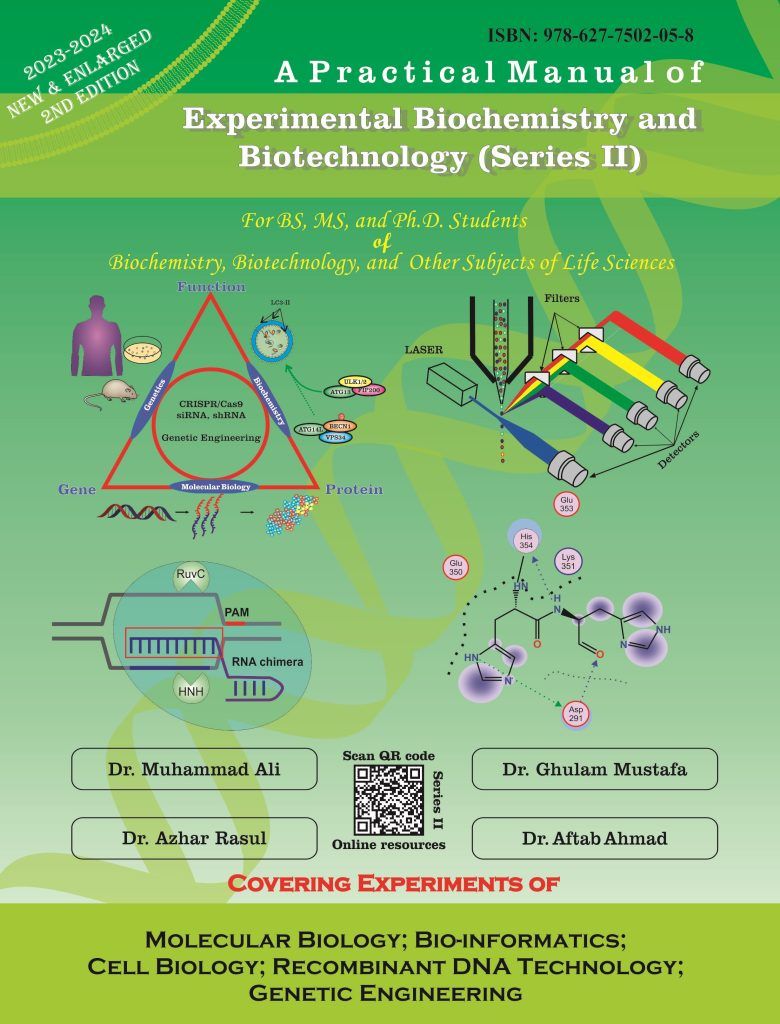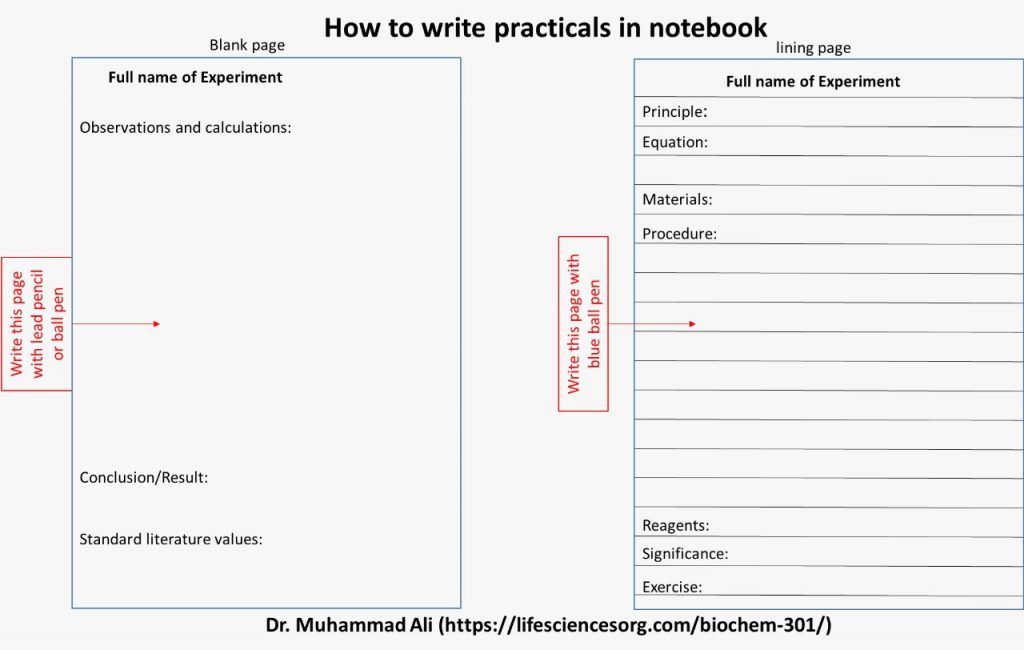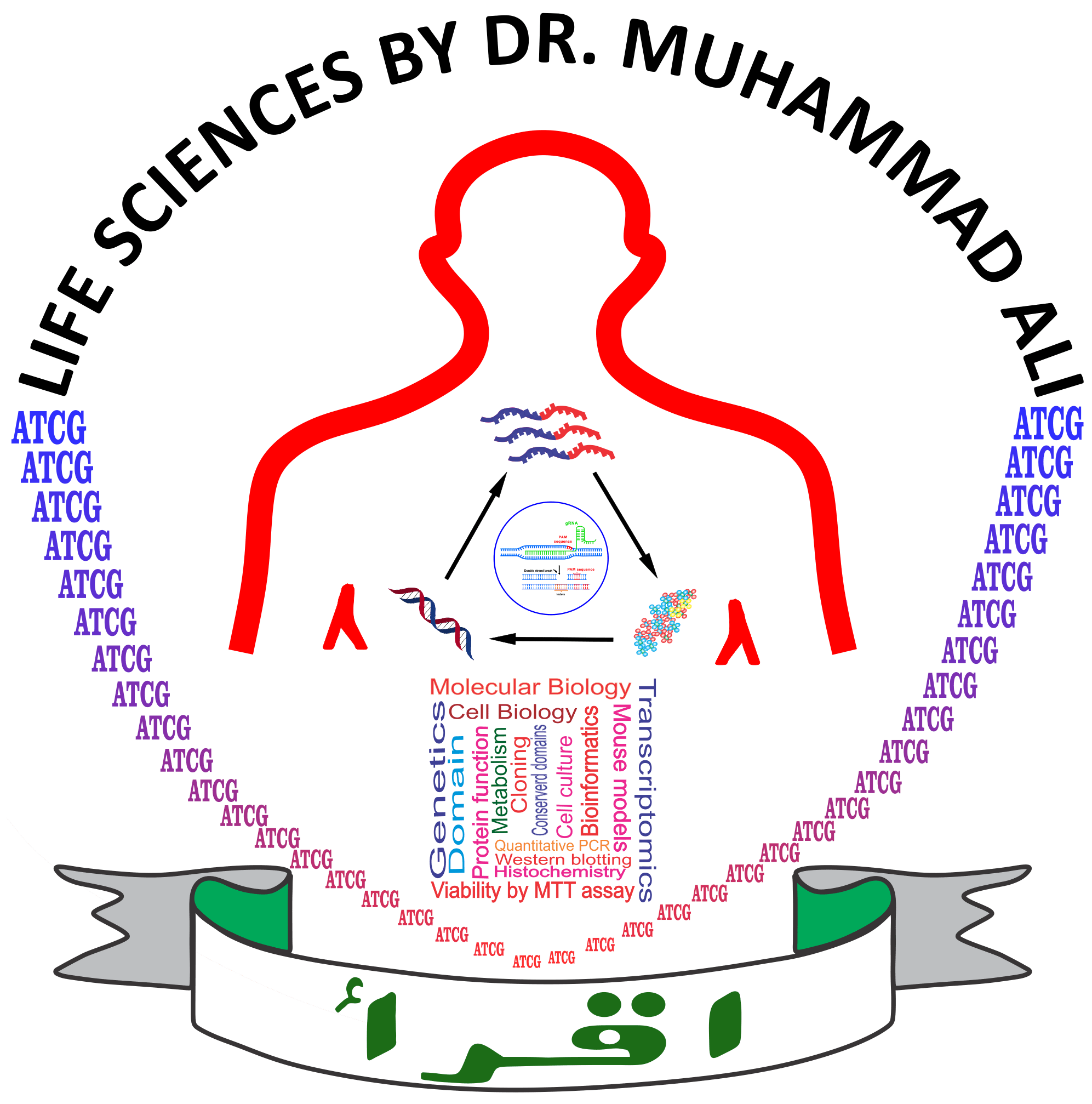Biochem-605, Molecular Biotechnology
(list of practical) 3(2-1)
- Isolation of genomic DNA from any biological sample; (1.4)
- Detection/confirmation of DNA via agarose gel electrophoresis;(1.11)
- Quantification of DNA/RNA via spectrophotometer;(1.7)
- Designing of Primers for Polymerase chain reaction;(1.8, 1.9)
- Polymerase chain reaction/amplification of a specific gene via thermocycler;(1.10)
- Digestion of DNA with restriction enzymes or PCR-RFLP. (4.5)
Ali, M. et al., Experimental Biochemistry and Biotechnology (Series II), 2023, 1st edition, ISBN: 978-969-23317-2-2.
Biochem-605 (Mid-term syllabus) 3(3-0):
Biotechnology and Molecular Biotechnology; Recombinant Protein Production; Gene isolation with PCR and RT-PCR; Agarose gel electrophoresis; Cloning in Plasmid: Plasmid preparation, restriction digestion; Screening of recombinant clones. DNA sequencing
PLUS………. First 150 MCQs from chapter 9 of the book ” MCQs in Biochemistry”.
Biochem-605 (After mid-term exam):
Heterologous expression of genes in bacteria and yeast; Recombinant protein isolation and purification; Antibodies and proteins for the study of protein expression; Transgenic animals and plants (GMOs); Gene therapy (CRISPER-CAS); Vaccine production using biotechnology.
……PLUS………. First 150 MCQs from chapter 9 of the book ” MCQs in Biochemistry”.
……PLUS……… Final exam will contain 30% from mid syllabus.
Biochem-605: Start preparing your presentations and assignments….. Presentations and Assignment will be taken in first class right after mid-term exam. The presentations will also be started right after mid-term exam.
__________________________________________________________________________________
Assignments and presentations:
- The weightage of the assignment and presentation will be decided later.
- Start preparing your presentations and assignments.
- The presentations will also be started right after the mid-term exam.
- PPT file should not contain any designing/colours other than figures and diagrams.
- Slides should be in 16X9 ratio.
- Fonts of all header should be same and of all other text should be same.
- For detailed guidelines about the presentation of research article, visit: https://www.lifesciencesorg.combiochem-720/
- Download the template ppt file to make your presentation. The link is here (copy this link and paste in a new tab).
- Strictly follow the ppt format and it is better if you write and paste your material in the same ppt file.
K. General Question to be asked during presentation
- 1) Pathway or importance of gene/technology/discovery
- 2) Rationale
- 3) Conclusion of the full article
- 4) Conclusion of every figure
- 5) New findings presented in the article
- 6) Applications of the findings
- 7) Future prospective
- 8) Applications of the work
- 9) Principle of every technique used in the research article
Moreover, provide me a printed summary of your article containing the above headings given under ‘K’.
L. During Presentations, for EVERY FIGURE and graph, we may ask:
1. The Principle of the experiment.
2. The Reason for doing the experiment.
3. The Physiological importance of the figure.
4. The Conclusions of the figure
5. Prepare well objectively and subjectively
NO EXCUSE WILL BE ACCEPTED
______________________________________________________________________________
MCQs will appear from text-book and from chapter 2 of the book ” MCQs in Biochemistry”.
Link to download this book is given below:
https://b-ok.cc/dl/1055171/2292c5
______________________________________________________________________________
Meeting ID: 316 824 288 013
Passcode: WNyjeA
______________________________________________________________________________
Microsoft teams will be used whenever online classes will be held. You must make your first name as your registration number.
2017-ag-9382 Haidar Iftikhar
2017-ag-10077 Ahmad Farazesentaino
Link to download the book ( MCQs in Biochemistry) is here.
BIOCHEM-605 Molecular Biotechnology 3(2-1)
Course Learning Outcomes
By the end of this course students will be able to;
- Demonstrate molecular biotechnology.
- Explain basic concepts in practical aspects of recombinant DNA technology.
- Demonstrate with advancements in applied biotechnology.
Theory
Biotechnology and Molecular Biotechnology; Recombinant Protein Production; Gene isolation with PCR and RT-PCR; Agarose gel electrophoresis; Cloning in Plasmid: Plasmid preparation, restriction digestion; Screening of recombinant clones. DNA sequencing; Heterologous expression of genes in bacteria and yeast; Recombinant protein isolation and purification; Antibodies and proteins for the study of protein expression; Transgenic animals and plants (GMOs); Gene therapy (CRISPER-CAS); Vaccine production using biotechnology.
Practical
Isolation of genomic DNA from any biological sample; Detection/confirmation of DNA via agarose gel electrophoresis; Quantification of DNA/RNA via spectrophotometer; Designing of Primers for Polymerase chain reaction; Polymerase chain reaction/amplification of a specific gene via thermocycler; Digestion of DNA with restriction enzymes or PCR-RFLP.
Suggested Readings
- Brown, T. 2016. Gene Cloning and DNA Analysis. 7th Ed. Blackwell Scientific Publications, Australia.
- Glick, B.R. and J.J. Pasternack. 2003. Molecular Biotechnology. 3rd Ed. American Society of Microbiology Press, USA.
- Nelson, D.L. and M.M. Cox. 2021. Lehninger’s Principles of Biochemistry. 8th Ed. WH Freeman & Company, USA.
- Primrose, S.B. and R.M. Twyman. 2016. Principles of Gene Manipulation and Genomics. 8th Ed. Blackwell Scientific Publications, Australia.
- Recent research papers on relevant contents.
- Ali, M. et al., Experimental Biochemistry and Biotechnology (Series I), 2023, 3rd edition, ISBN: 978-969-7502-04-1
- Ali, M. et al., Experimental Biochemistry and Biotechnology (Series II), 2019. 1st edition, ISBN: 978-969-23317-2-2.
- Ali, M. et al., Experimental Biochemistry and Biotechnology (Series III), 2023, 1st edition, ISBN: 978-969-23317-6-0


| Biochem-605, BS Biochem, 5TH, M-Winter 2023, Dr. Muhammad Ali; 28-08-2023 | ||||
| Sr. | Ag No. | Student’s Name | Group | Research article for presentation and 1 page summary |
| 1 | 2021-ag-8431 | Eisha Zahid | G1 | Emodin attenuates high lipid-induced liver metastasis through the AKT and ERK pathways in vitro in breast cancer cells and in a mouse xenograft model |
| 2 | 2021-ag-8441 | Linta Shafique | ||
| 3 | 2021-ag-8452 | Muhammad Haris | ||
| 4 | 2021-ag-8458 | Muhammad Ramzan | ||
| 5 | 2021-ag-8463 | Nimra Shoukat | ||
| 6 | 2021-ag-8466 | Noor-Ul-Ain | G2 | PRMT6 Regulates RAS/RAF Binding and MEK/ERKMediated Cancer Stemness Activities in Hepatocellular Carcinoma through CRAF Methylation |
| 7 | 2021-ag-8472 | Saliha Nawaz | ||
| 8 | 2021-ag-8484 | Abdul Qadeer | ||
| 9 | 2021-ag-8485 | Aleena Khalid | ||
| 10 | 2021-ag-8486 | Aleeza Tahir | ||
| 11 | 2021-ag-8487 | Ali Raza | G3 | Impaired LXRa Phosphorylation Attenuates Progression of Fatty Liver Disease |
| 12 | 2021-ag-8488 | Amna Hamid | ||
| 13 | 2021-ag-8490 | Anooma | ||
| 14 | 2021-ag-8491 | Ansa Sehar | ||
| 15 | 2021-ag-8492 | Areej Fatima Ikram | ||
| 16 | 2021-ag-8493 | Asnan Saleem | G4 | Aldolase B-Mediated Fructose Metabolism Drives Metabolic Reprogramming of Colon Cancer Liver Metastasis |
| 17 | 2021-ag-8494 | Ayesha Hassan | ||
| 18 | 2021-ag-8495 | Ayesha Tahir | ||
| 19 | 2021-ag-8496 | Esha Batool | ||
| 20 | 2021-ag-8497 | Esha Mujahid | ||
| 21 | 2021-ag-8498 | Fatima Haider | G5 | Treatment of acromegaly by rosiglitazone via upregulating 15-PGDH in both pituitary adenoma and liver |
| 22 | 2021-ag-8499 | Fatima Tahir | ||
| 23 | 2021-ag-8500 | Ghazia Ashraf | ||
| 24 | 2021-ag-8501 | Hadia Akram | ||
| 25 | 2021-ag-8502 | Hafsa Areej | ||
| 26 | 2021-ag-8503 | Iman Fatima | G6 | In vivo CRISPR screens identify the E3 ligase Cop1 as a modulator of macrophage infiltration and cancer immunotherapy target |
| 27 | 2021-ag-8504 | Iman Fatima | ||
| 28 | 2021-ag-8505 | Iqra Javed | ||
| 29 | 2021-ag-8507 | Kashaf E Noor | ||
| 30 | 2021-ag-8509 | Khadija Fatima | ||
| 31 | 2021-ag-8510 | Kiran Arshad | G7 | Selective Surface PEGylation of UiO-66 Nanoparticles for Enhanced Stability, Cell Uptake, and pH-Responsive Drug Delivery |
| 32 | 2021-ag-8511 | Mahnoor | ||
| 33 | 2021-ag-8512 | Mahnoor Fatima | ||
| 34 | 2021-ag-8513 | Manahil Kashif | ||
| 35 | 2021-ag-8514 | Maryam Naseer | ||
| 36 | 2021-ag-8515 | Minahil | G8 | Preventing Allograft Rejection by Targeting Immune Metabolism |
| 37 | 2021-ag-8517 | M.Ahtesham Muhedeen | ||
| 38 | 2021-ag-8518 | M. Ehtisham Basel | ||
| 39 | 2021-ag-8521 | Muhammad Shahzad | ||
| 40 | 2021-ag-8525 | Muqaddas Raza | ||
| 41 | 2021-ag-8526 | Naila Nawaz | G9 | Alteration of Tumor Metabolism by CD4+ T Cells Leads to TNF-a-Dependent Intensification of Oxidative Stress and Tumor Cell Death |
| 42 | 2021-ag-8527 | Namal Rauf | ||
| 43 | 2021-ag-8528 | Nimra Akram | ||
| 44 | 2021-ag-8529 | Noor Fatima | ||
| 45 | 2021-ag-8530 | Noor Fatima | ||
| 46 | 2021-ag-8531 | Noreen Ayesha | G10 | Controlling cancer-induced inflammation with a nucleic acid scavenger prevents lung metastasis in murine models of breast cancer |
| 47 | 2021-ag-8532 | Rafia Zulfiqar | ||
| 48 | 2021-ag-8533 | Sadaqat Ali | ||
| 49 | 2021-ag-8535 | Toima Riaz | ||
| 50 | ||||
